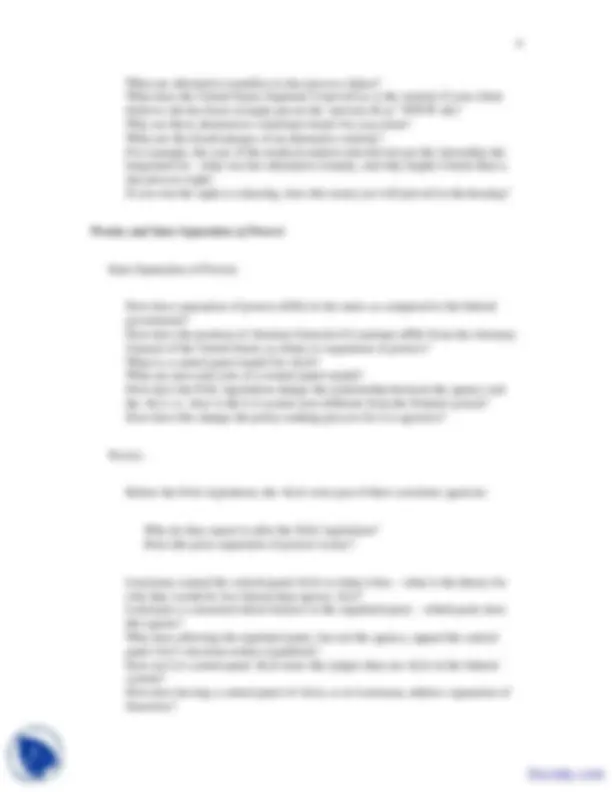





Study with the several resources on Docsity

Earn points by helping other students or get them with a premium plan


Prepare for your exams
Study with the several resources on Docsity

Earn points to download
Earn points by helping other students or get them with a premium plan
Community
Ask the community for help and clear up your study doubts
Discover the best universities in your country according to Docsity users
Free resources
Download our free guides on studying techniques, anxiety management strategies, and thesis advice from Docsity tutors
Various aspects of due process, including the differences between substantive and procedural due process, takings, new property, goldberg v. Kelly, matthews v. Eldridge, liberty interests, and alternative remedies. Topics covered include the definition of a 'taking,' the difference between old and new property, the procedural rights established in goldberg v. Kelly, the impact of the welfare reform act of 1996 on welfare as an entitlement, and the separation of powers issues in the wooley case. Questions answered include what is a 'taking,' what is the 'new property,' what are the procedural rights established in goldberg v. Kelly, and what are alternative remedies to due process claims.
Typology: Study notes
1 / 5

This page cannot be seen from the preview
Don't miss anything!




Chapter 4
Due Process
What is the difference between substantive and procedural due process? Takings (property)
What is a "taking"? What due process is involved? What about compensation? How is compensation measured? What is a regulatory taking?
New Property
What is the "new property"? (Examples?) What is the "bitter with the sweet" doctrine ( Loudermill )? Is it still good law? How are the rights different for new property versus old property?
What if I take your medical license, versus taking your land? What if I abolish your government job or your welfare entitlement?
What do Roth and Sinderman tell us about the due process rights of public employees?
What do they tell us about why LSU has not commented or explained its position on the merits of the Van Heerden case?
Why did the suicidal policeman not get a hearing?
Why did the court find that putting his dismissal in his employment file meant that it was public?
Goldberg
What makes a benefit an entitlement? What is a matrix regulation?
What was the fight in Goldberg over the timing of the hearing, i.e., what was plaintiff's argument for a pre-termination versus post-termination hearing? What was the informal process for terminating benefits that the plaintiffs want to change? Why was it subject to serious bias claims? What were the allegations about the problems with the informal process that would be cured by a pre-termination hearing? Explain the procedural rights established in Goldberg v. Kelly , how they differ from the rights given indigent criminal defendants, and how the rights are specifically tailored to the special problems posed in providing due process to an indigent welfare population. In general, how does right to counsel different in agency and criminal cases? What was the impact on the state welfare system of creating the Goldberg rights? How did the Welfare Reform Act of 1996 eliminate welfare as an entitlement?
Cost Benefit Analysis and Due Process
How does Matthews v. Eldridge modify Goldberg?
Why did the court limit the Goldberg rights to the facts in Goldberg , i.e., why were they not applied to Matthews and subsequent cases? What benefit was at issue in Matthews and how was the review of the factual basis for the claim different from Goldberg? Why did the court believe that a post-termination hearing was OK in Matthews and not in Goldberg? Did the Matthews court overrule Goldberg?
What is the Matthews balancing test? How is this analysis different from the due process analysis in criminal cases? How did the courts apply Matthews in later cases?
What is the Matthews analysis in school suspension and paddling cases?
How does the Matthews analysis dovetail with discretionary decisionmaking as a defense to tort claims against the agency? (You will not be able to answer this until we finish the last part of the course on suing agencies.)
What is congressional casework? (Think of examples.)
What did the Pillsbury case tell us about the limits on Congressional
What are alternative remedies to due process claims? What does the United States Supreme Court tell us is the remedy if your client believes she has been wrongly put on the "perverts R us" WWW site? Why are these alternatives sometimes better for you client? What are the disadvantages of an alternative remedy? For example, the case of the medical student who did not get the internship she bargained for - what was her alternative remedy, and why might it better than a due process right? If you win the right to a hearing, does this mean you will prevail in the hearing?
Wooley and State Separation of Powers
State Separation of Powers
How does separation of powers differ in the states as compared to the federal government? How does the position of Attorney General of Louisiana differ from the Attorney General of the United States as relates to separation of powers? What is a central panel model for ALJs? What are pros and cons of a central panel model? How does the DAL legislation change the relationship between the agency and the ALJ, i.e., how is the LA system now different from the Federal system? How does this change the policy making process for LA agencies?
Wooley
Before the DAL legislation, the ALJs were part of their constitute agencies.
Who do they report to after the DAL legislation? Does this pose separation of powers issues?
Louisiana created the central panel ALJs to reduce bias – what is the theory for why they would be less biased than agency ALJ? Louisiana is concerned about fairness to the regulated party – which party does this ignore? Why does allowing the regulated party, but not the agency, appeal the central panel ALJ’s decision reduce regulation? How are LA central panel ALJs more like judges than are ALJs in the federal system? How does having a central panel of ALJs, as in Louisiana, address separation of functions?
What is the separation of powers issue in the Wooley case? What does the court say is the key attribute of an Article V judge? How did the LA SC explain why LA ALJs are not Article V judges and thus do not need to be elected? Why is the LA SC's definition of a judge and an ALJ circular? What did Wooley leave unresolved that lead to the Bonvillian cases? What is an action for mandamus and what its limitations? Why was mandamus denied in Bonvillian I? What legal action did petitioners successfully use to get his license? How does the second Bonvillian case undermine the LA SC's resolution of Wooley?